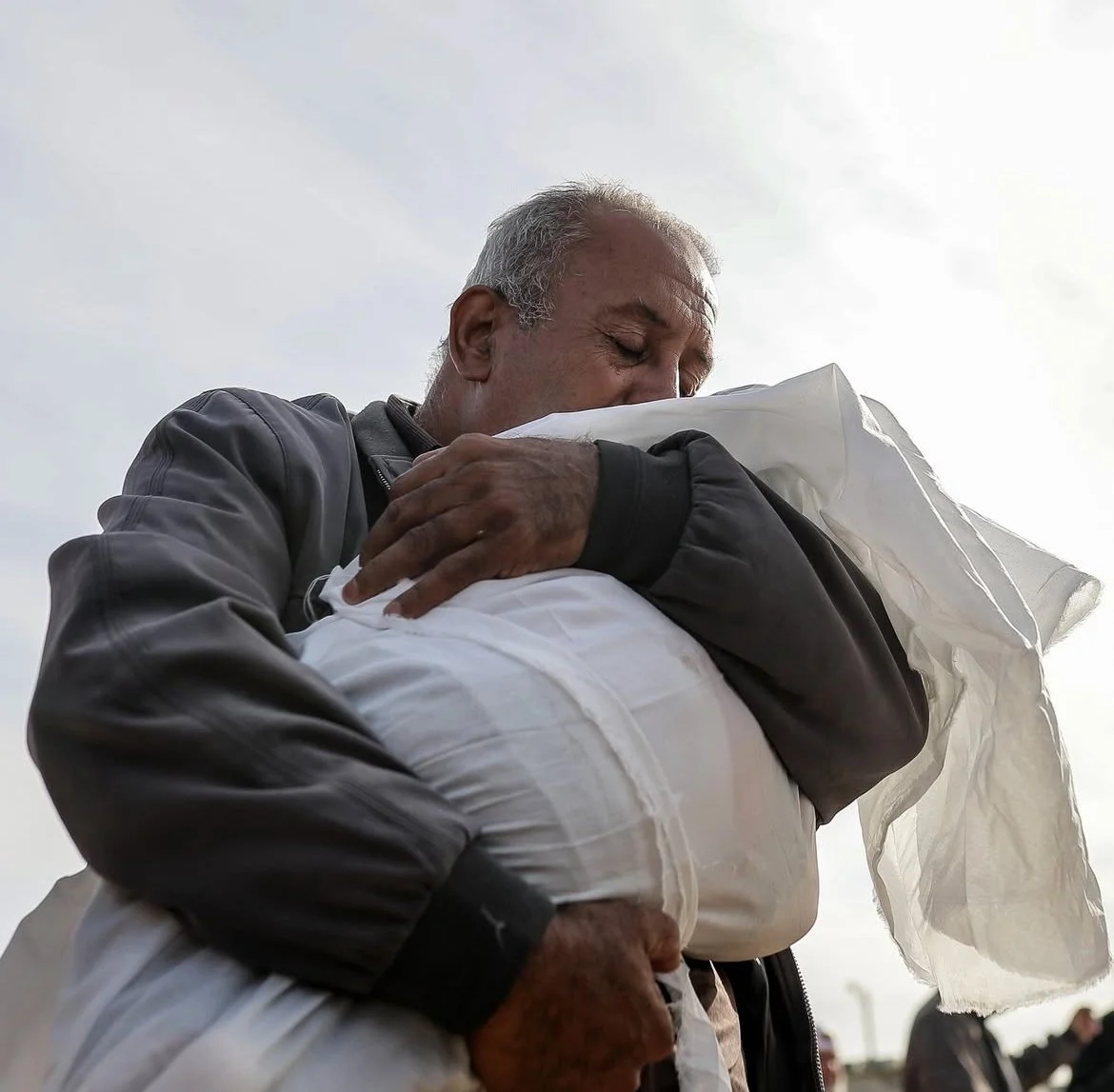In Mourning, We Remain
KHAN YUNIS, GAZA - DECEMBER 22:A grandfather bids farewell to his grandson, who was martyred with his parents in an Israeli bombing of their home in the city of Khan Yunis. Gaza on December 22, 2023. (Photo by Belal Khaled)
There’s a lot to unpack, but I refuse to intellectualize our suffering. I call on you not to overanalyze, or to rationalize, or to project theories over the rawness of what we've endured, what Gaza's endured. We have to be vigilant, because this moment, this terrain, should have been reached long before October 7th. I speak of a terrain where Palestinians are seen as equal, as people who deserve life and have life. There's two sides to this ceasefire.
You see, there is heartbreak. We have been disemboweled, eviscerated, stripped of everything that anchors a people to the world. Many Palestinians I know no longer speak of grief but of hollowing -- a loss of orientation in a world that has watched our suffering with studied indifference. Over these two years, as our dead multiplied, the world’s silence became its own declaration: that the blood of the wretched is expendable, that the cries of the silenced serve its moral vanity. In this horror, a new arithmetic was revealed where two hundred settlers weighed against 2.2 million Palestinians. This preposterous equation, more a colonial calculus, was accepted by humanity and is nothing short of obscene, cruel, and utterly revealing. For the colonizer’s life is chronicled, sanctified, and defended, while the colonized are reduced to numbers, counted only in death, and remembered only as debris.
Before all this, I might have told you that every life is sacred, that even ethics demands equality even under oppression. But now I ask, why must the oppressed cling to ethics the oppressor never had? Why must we uphold balance when the world has already chosen sides? For decades, Palestinians gave up so much for so little, believed in compromise, and still were met with annihilation. What is left to give? Our limbs have been scattered, our organs buried in rubble, our parents crushed (literally) under tanks. I will not narrate the full horror for you know it all to well. We have documented enough.
To our comrades in struggle, those who have stood beside us even when our so-called Arab kin have turned away, I advice us to meet this ceasefire, whenever it comes, with two gestures. The first is mourning. We must let our people mourn freely. Let mothers and fathers gather the remains of their children without cameras, without commentary. Let them find silence, because silence is beautiful, and it has been stolen from us. I must emphasize that silence is not emptiness but rather the first condition of healing. It gives the mourner a moment to breathe without intrusion, to hear the echo of what has been lost. In silence, there is a fragile sense of normalcy, cultivating a space where the heart can begin to understand what the mind cannot yet accept. It is in silence that grief stops performing for the world and becomes real again, where one can finally listen to one’s own trembling, to the pulse of absence. Chaos forces reaction while silence allows recognition. And recognition, in the wake of all this death, is the first act of returning to life.
The second is recognition. As twisted as it sounds, this moment carries an atom of a victory. The colonizer did not achieve what they sought most: our erasure. If you listen to their leaders, read their manifestos, hear their language, their goal was not just demographic majority but actually our disappearance, and I mean it in a literal sense. And yet despite all of this Palestinians in Gaza remained. That is why we have won, for endurance is rooted in a bond to the land that the colonizer can neither understand nor replicate.
This atom, which ought to grow in the years to come, is also in the exposure of the colonizer, for the greatest enemy of Israel today is not only the one who resists with arms, but uniquely the mother who refused to leave her home, who stayed rooted in her soil despite all that was unleashed upon her and her kin. But let me state it clearly that we must not romanticize this endurance, nor ever turn Palestinian mothers into symbols of sacrifice. We must not expect from them the superhuman strength to choose ruins over safety. What I mean in my praising is that despite the unimaginable pain, the chaos, and the relentless machinery of destruction, those who stayed, enacted a terrifying, impossible, but human act that shattered the fantasy of erasure.
The days ahead will be rocky, we must keep our pressure high, for Israel loves to show its most violent colours before a ceasefire. When the guns and drones cease to be pointed at Gaza, even momentarily, we must mourn, but especially they, from what was taken, what will never return, and what still breathes beneath the rubble. In mourning, we keep the names alive. In mourning, we remember that to feel loss is still to feel love.
